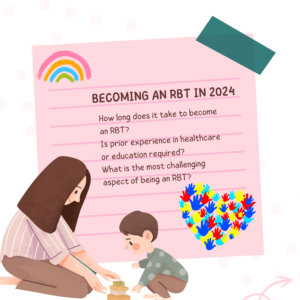What is an RBT?
Table of Contents
Have you ever considered a career where you make a real difference in people’s lives every day? Welcome to the world of Registered Behavior Technicians (RBTs)! These professionals are the backbone of Applied Behavior Analysis (ABA) programs, providing direct support and implementing intervention plans for individuals with autism and other developmental disorders. Join us as we dive into the journey of becoming an RBT in 2024 and explore this rewarding career path.
The Role of an RBT
The heart of an RBT’s role is implementing behavior-analytic services guided by a supervising behavior analyst. RBTs work directly with clients, applying ABA principles to help them develop social, communication, and life skills. This may include teaching new behaviors, reducing problematic behaviors, and recording data on client progress. A typical day for an RBT is diverse and dynamic, involving one-on-one client interactions, team meetings, and continuous learning. RBTs collaborate closely with behavior analysts, families, and other professionals as part of a treatment team, playing a crucial role in the client’s developmental journey.

Requirements to be an RBT
The journey to becoming an RBT starts with meeting the educational prerequisites. As of 2024, you need at least a high school diploma or equivalent. Next comes the 40-hour training, covering ABA principles, ethics, and specific intervention techniques. This comprehensive training ensures you’re well-equipped with the foundational knowledge needed for the role.
Background checks are non-negotiable. Given the sensitivity of working with vulnerable populations, RBT candidates must clear stringent background checks to ensure client safety and trust.
The RBT Certification Process
You’ll need to navigate through a series of steps to earn your RBT badge. First, complete your application, which includes documenting your education and training. The RBT competency assessment, conducted by a qualified behavior analyst, evaluates your practical skills and understanding of key concepts.
Then comes the big one – the RBT examination. This multiple-choice test assesses your grasp of your knowledge of ABA principles, client interaction, and ethical guidelines. It’s a computer-based exam, typically consisting of 75 questions. Preparation is key, so make sure to review your training materials and perhaps even take a few practice tests.
Maintaining RBT Certification
Once you’ve passed the exam and earned your certification, the journey doesn’t stop there. RBTs must engage in ongoing supervision, which includes regular performance reviews and feedback sessions with a supervising behavior analyst. This supervision is crucial for maintaining the quality of service and for your professional growth.
Every year, you’ll need to complete several continuing education hours to stay updated with the latest ABA practices. And don’t forget about the renewal process for your certification, which ensures you’re consistently meeting the high standards set by the Behavior Analyst Certification Board (BACB).
Career Path and Opportunities
As an RBT, you’ll have a myriad of opportunities for career advancement. With experience and further education, you might decide to pursue becoming a Board Certified Behavior Analyst (BCBA). This role involves designing and overseeing ABA programs and offers a broader scope of practice. Moreover, the skills and experience you gain as an RBT can open doors in related fields like special education, child development, and clinical psychology.
Despite the challenges, the role of an RBT is incredibly fulfilling. You’ll witness firsthand your work’s positive impact on individuals and families, making it a gratifying career.
Make a Difference in 2024
The role of a Registered Behavior Technician is more than just a job – it’s a commitment to making a meaningful difference in the lives of those you work with. The journey to becoming an RBT requires dedication, passion, and a willingness to learn. If you’re ready to embark on this rewarding career path, 2024 could be your year to shine!

FAQ Section
- Q: How long does it take to become an RBT?
- A: Typically, you can complete the training and certification process within a few weeks.
- Q: Is prior experience in healthcare or education required?
- A: No, prior experience is not a requirement, although it can be beneficial.
- Q: Can I work part-time as an RBT?
- A: Yes, part-time positions are available, offering flexibility to accommodate various schedules.
- Q: Are there any online resources for RBT exam preparation?
- A: Absolutely! Several online platforms offer study materials, practice exams, and additional resources to help you prepare.
- Q: What is the most challenging aspect of being an RBT?
- A: While it varies for everyone, many RBTs find managing challenging behaviors and maintaining emotional resilience in the face of difficult situations to be the most challenging aspects.
- Q: Can RBTs specialize in specific areas within ABA?
- A: Yes, with experience, RBTs can specialize in areas like early intervention, autism, or adult services.
Becoming an RBT in 2024
And that wraps up our guide to becoming a Registered Behavior Technician in 2024! Whether you’re just starting your journey or are on the path to certification, remember that your role is pivotal in enriching lives and fostering positive change. Embrace the challenges, celebrate the victories, and above all, keep learning and growing in this dynamic field. Your impact as an RBT is truly immeasurable!
Fore more information, check out the BACB!



